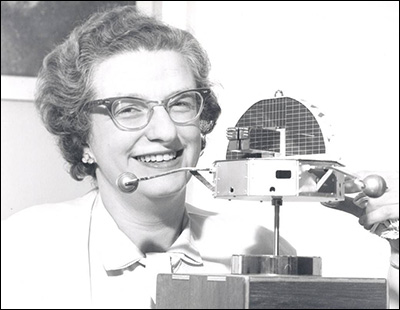ASP Announces Nancy Grace Roman Award for Promoting Gender Equity
Linda Shore Astronomical Society of the Pacific
The Astronomical Society of the Pacific (ASP) has established a new award, named in honor of Nancy Grace Roman, to celebrate the contributions of individuals, groups, and/or organizations working to encourage women and girls to participate in astronomy and related fields and promote gender inclusion. Calls for nominations for the inaugural award will be announced in early 2022 with the recipient, selected by the ASP Board of Directors, to be honored in a ceremony later that year.
About Dr. Nancy Grace Roman
 Nancy Grace Roman was an icon in the history of astronomy research and space exploration. She was often called “mother” of the Hubble Space Telescope for her work in spearheading its development. Roman was also a vocal advocate for encouraging girls to participate in science, technology, engineering, and math (STEM) fields as well as a generous supporter of the ASP. Born in 1925, Roman loved astronomy from a very early age and credited her parents’ encouragement as the engine that fueled her lifelong passion for science by teaching her to bird watch, love nature, and observe the stars, and locate constellations. By the time she was 11 years old, she had organized a weekly astronomy club for her girlfriends, so she could share her knowledge about the night sky with them.
Nancy Grace Roman was an icon in the history of astronomy research and space exploration. She was often called “mother” of the Hubble Space Telescope for her work in spearheading its development. Roman was also a vocal advocate for encouraging girls to participate in science, technology, engineering, and math (STEM) fields as well as a generous supporter of the ASP. Born in 1925, Roman loved astronomy from a very early age and credited her parents’ encouragement as the engine that fueled her lifelong passion for science by teaching her to bird watch, love nature, and observe the stars, and locate constellations. By the time she was 11 years old, she had organized a weekly astronomy club for her girlfriends, so she could share her knowledge about the night sky with them.
After completing an accelerated high school program, she earned a degree in astronomy from Swarthmore College in 1946, followed by a doctorate in astronomy from the University of Chicago in 1949. Ten years later, Roman became the first woman to hold an executive position at NASA, overseeing a new program for space astronomy. NASA itself was a new government agency, and in her position Roman toured the country to talk to the nation’s research astronomers, find out what they wanted to study, and then convince them to consider the many advantages of collecting their data from space.
In the years that followed, Roman planned many of the highly successful programs and experiments for NASA’s space missions, including Gemini, Apollo, Skylab, and Spacelab. In 1979 NASA felt ready to develop a program to launch a large and versatile space-based telescope. Roman was hired by the agency to plan and campaign for this new generation of telescope, helping NASA pitch the project to a variety of skeptical government agencies, including Congress. Roman’s passionate advocacy is credited for the launch of the Hubble Space Telescope in 1990, the instrument that for decades has provided the research community with images and data that have fundamentally transformed humanity’s understanding of the cosmos. Most recently, NASA announced it is naming its next-generation space telescope — the Wide Field Infrared Survey Telescope (WFIRST) — in honor of Nancy Grace Roman.
For more about ASP awards, see the announcement from which this post is adapted.

